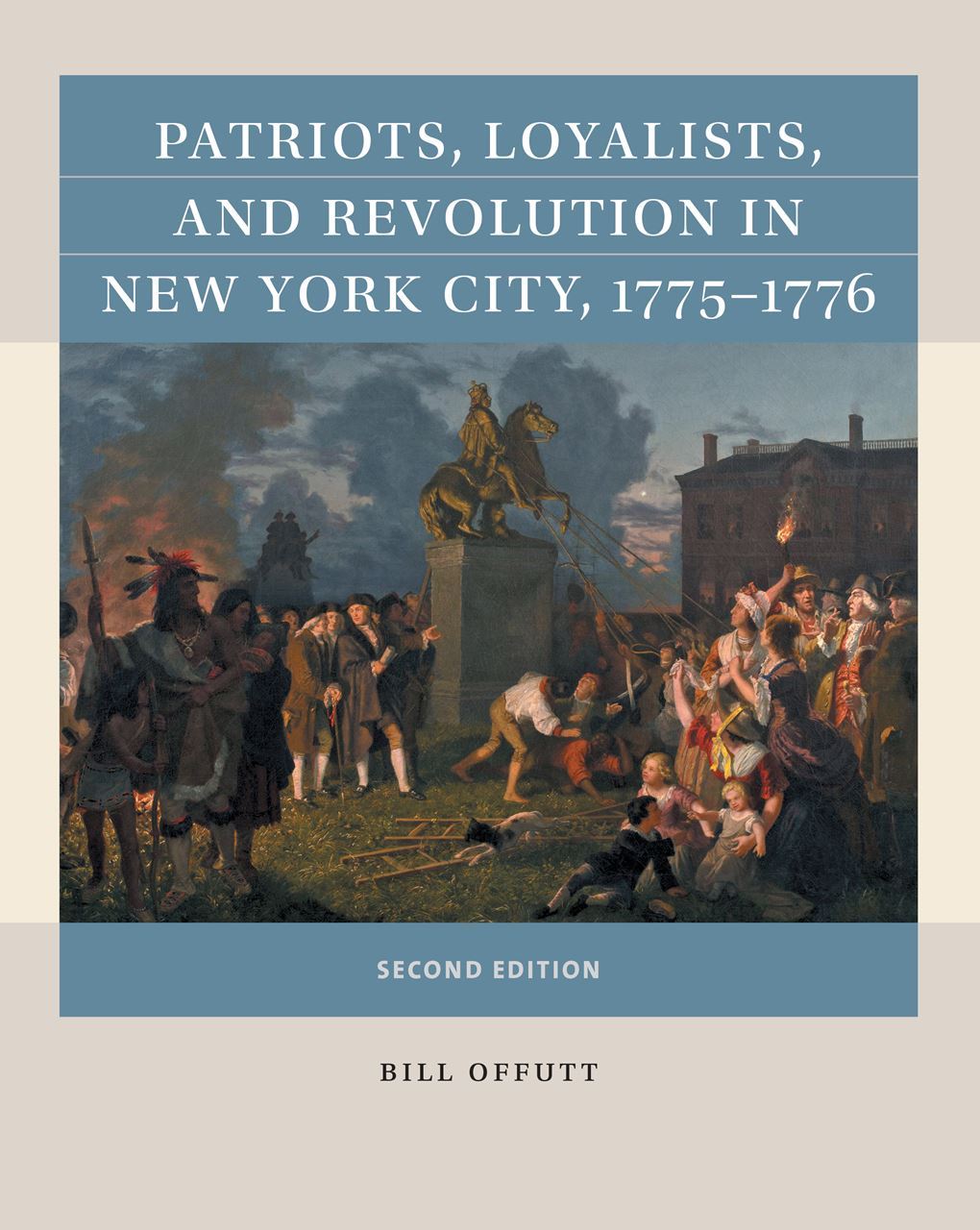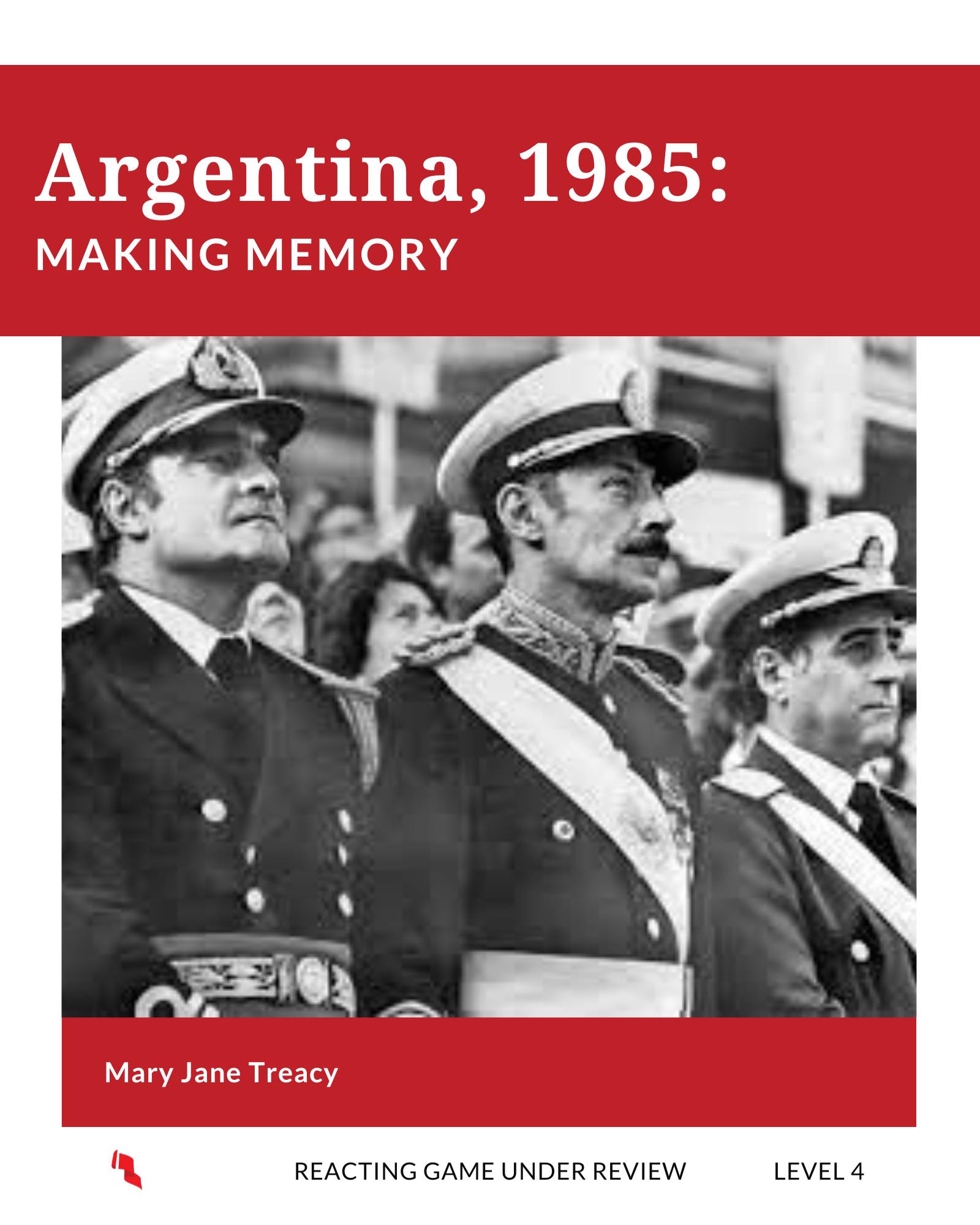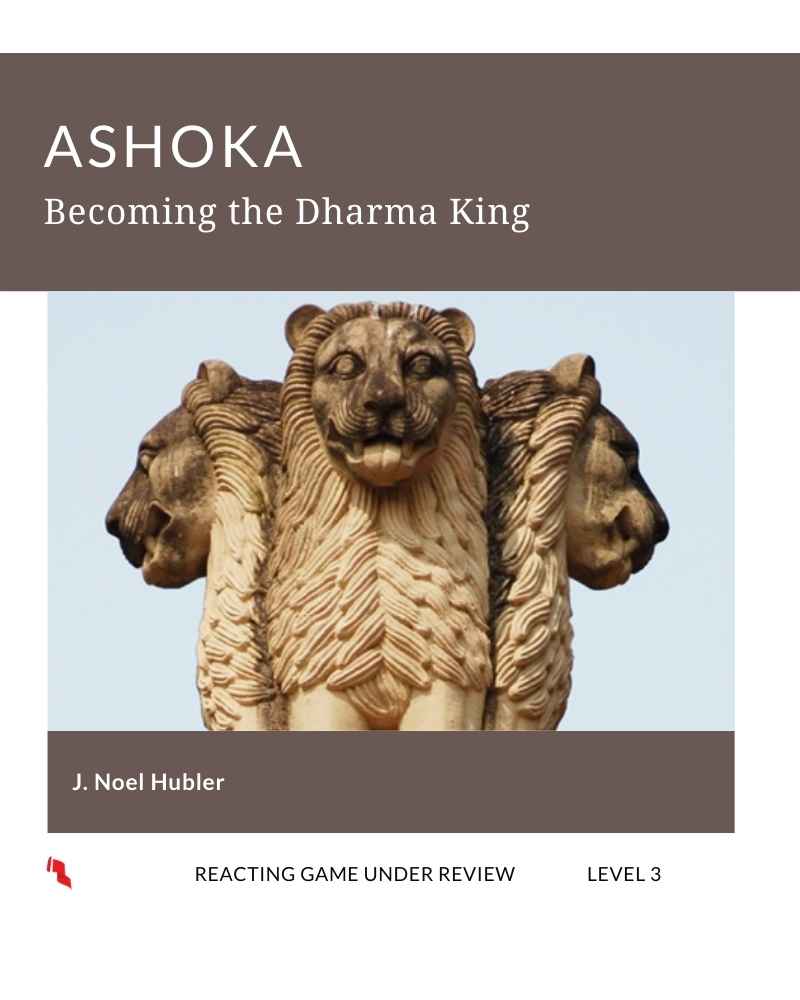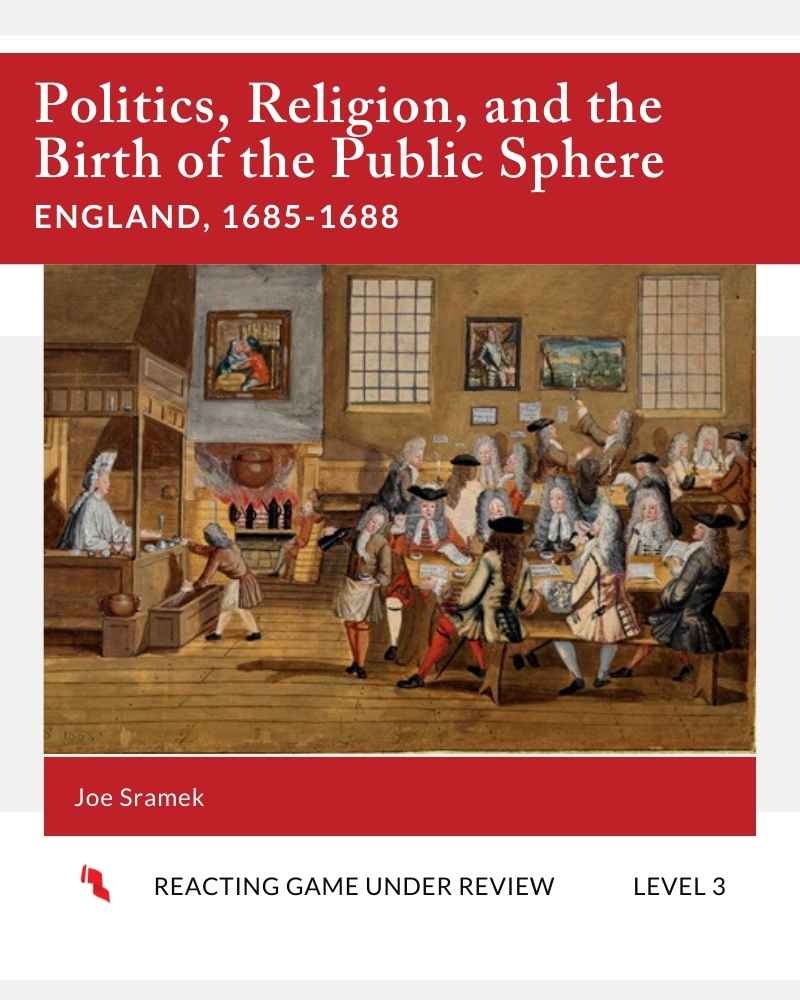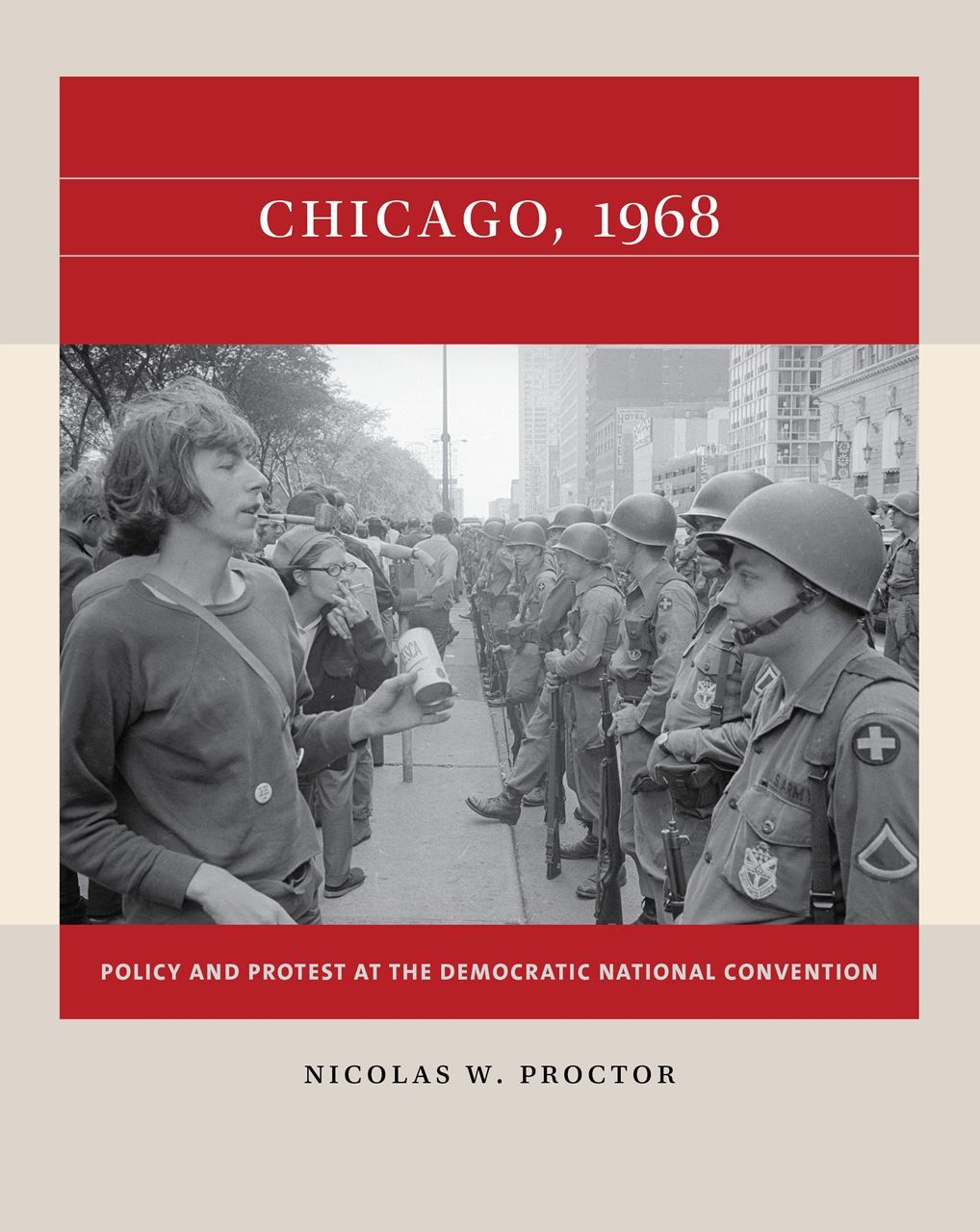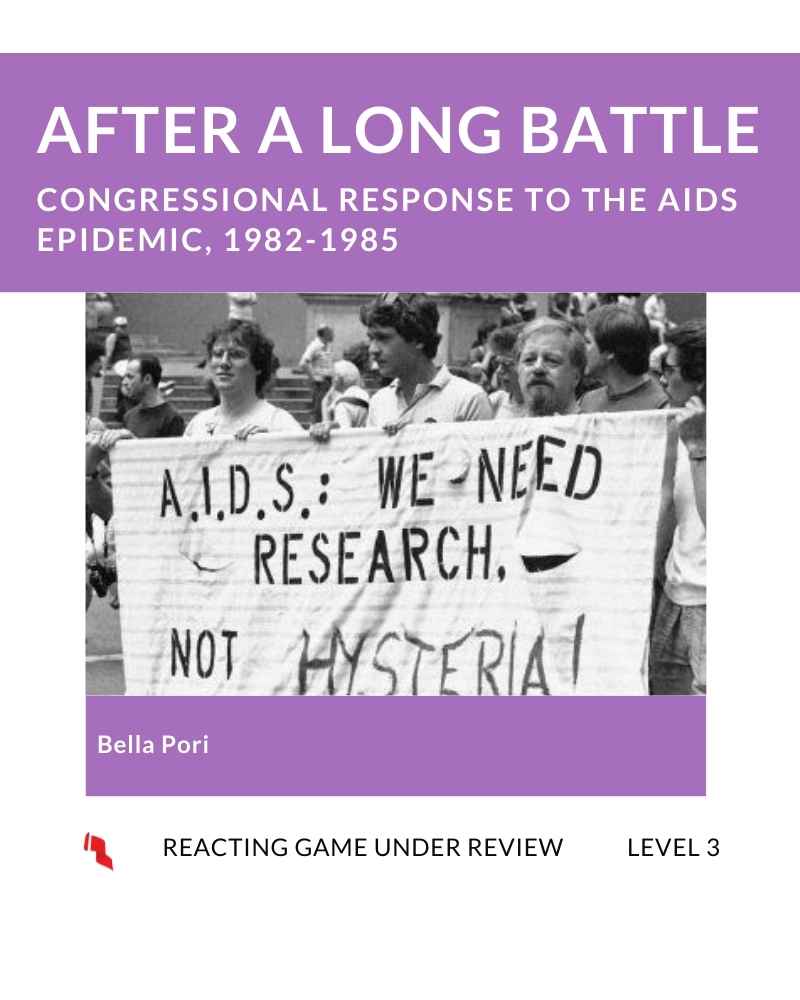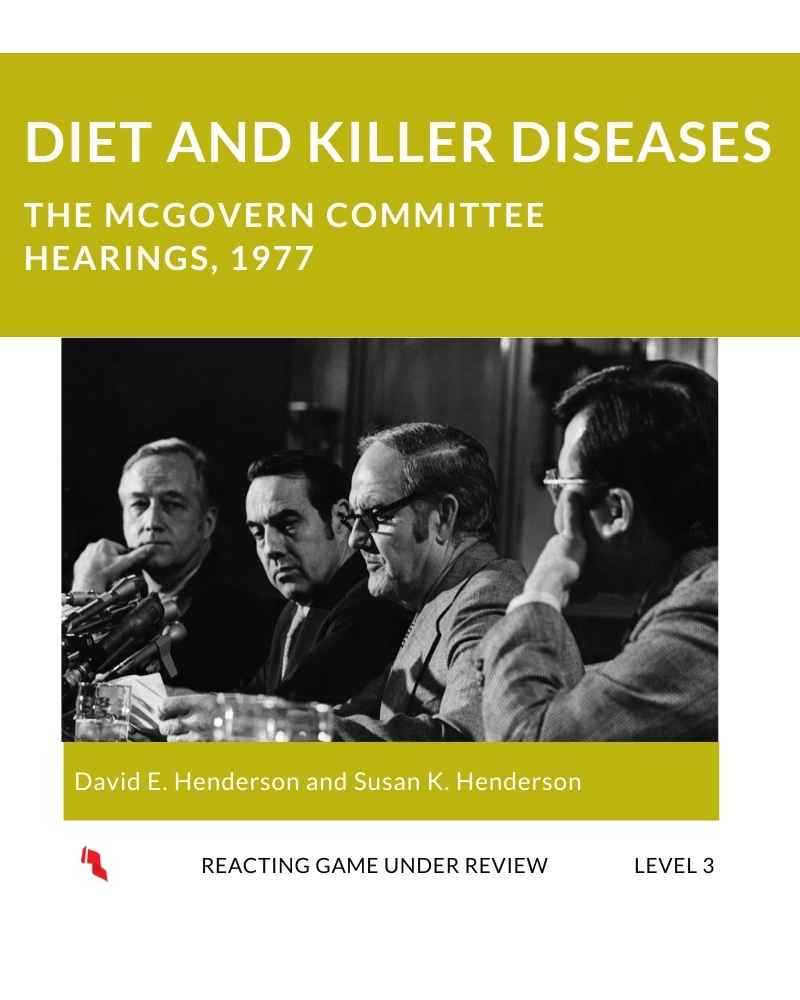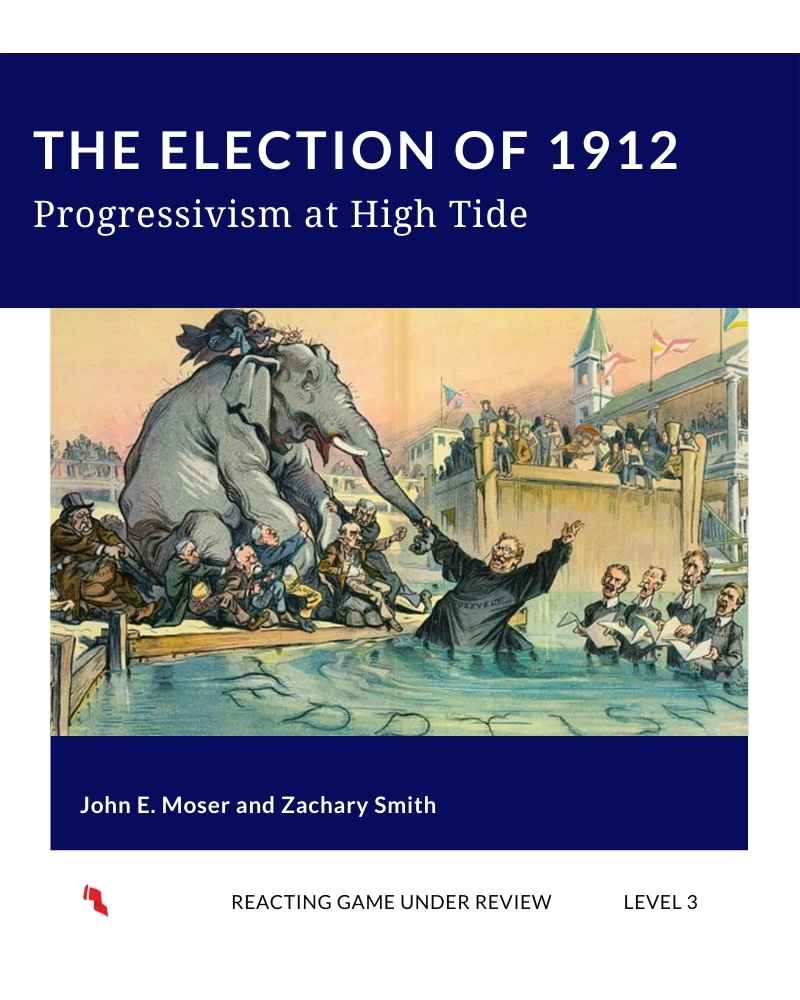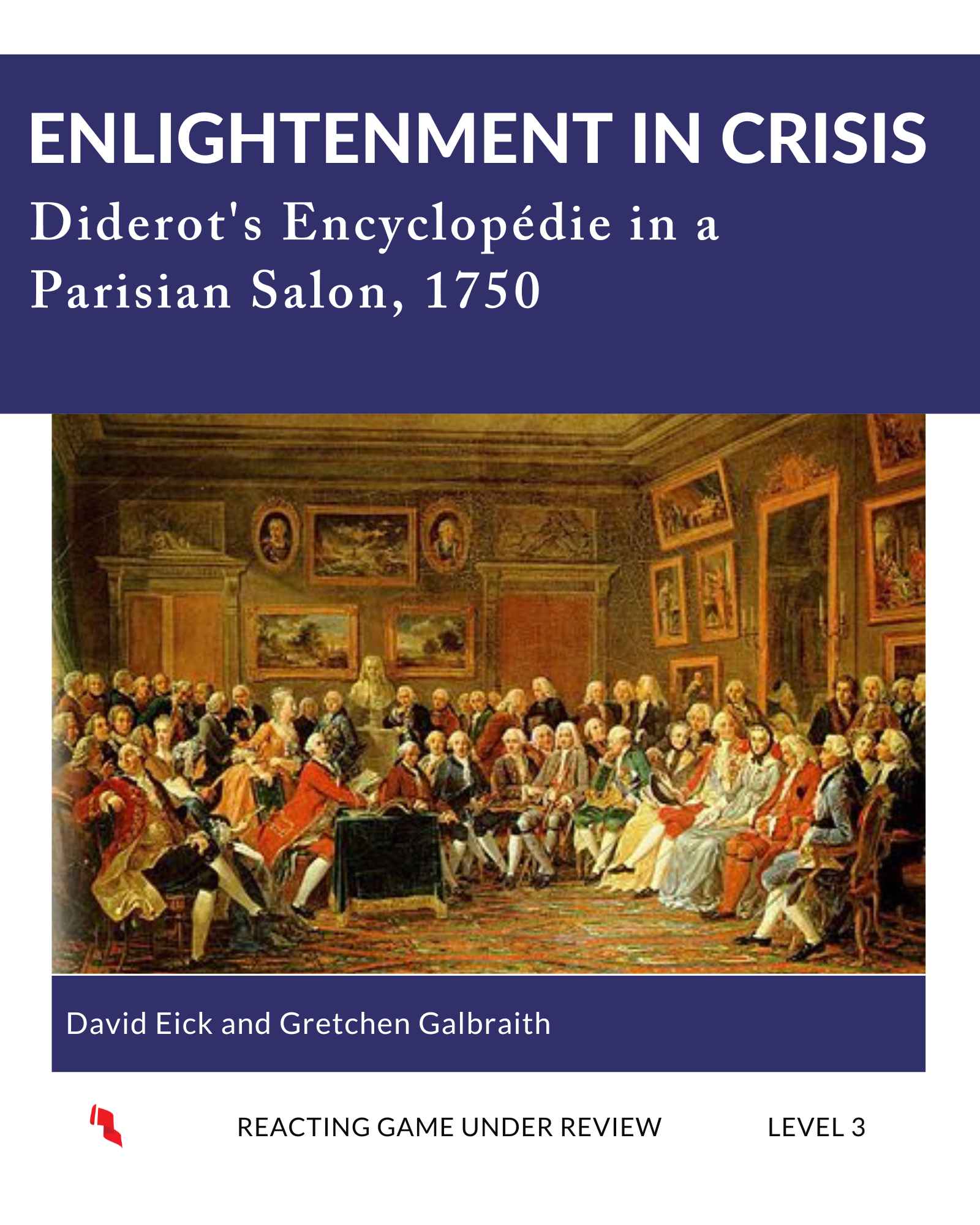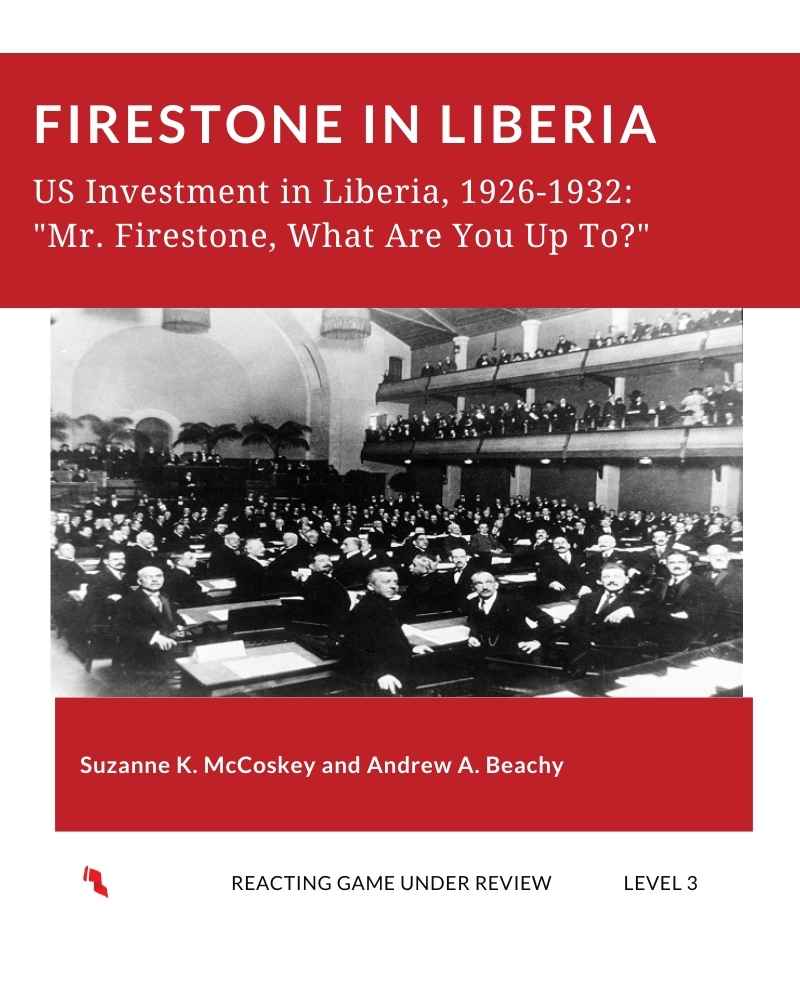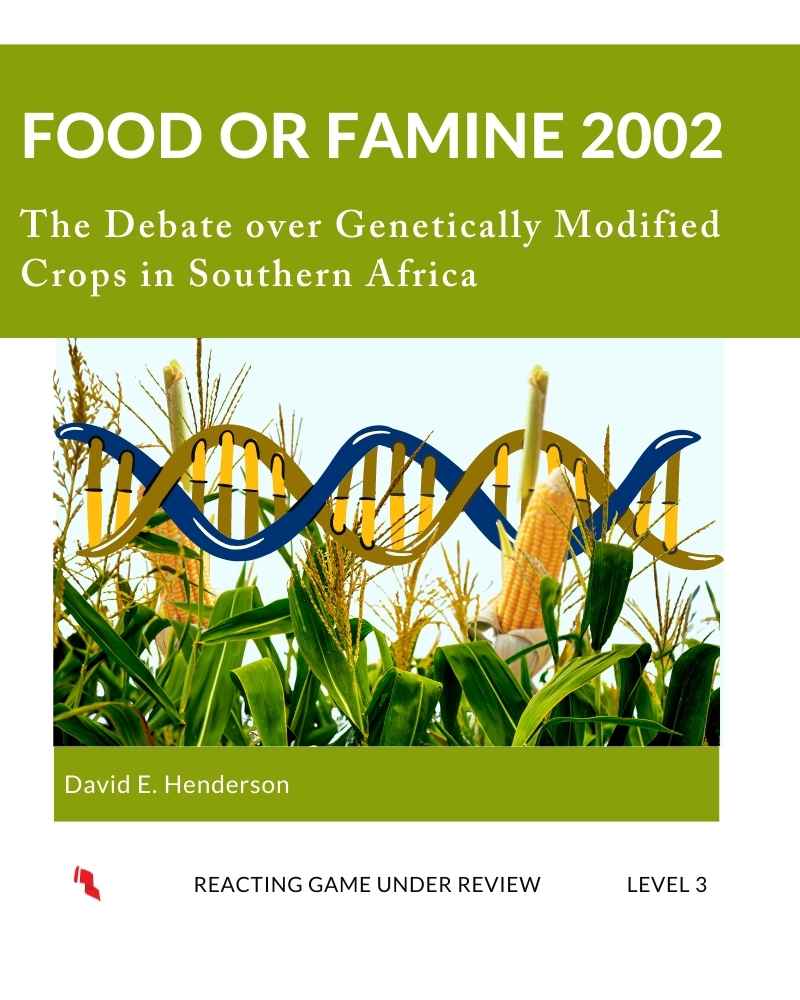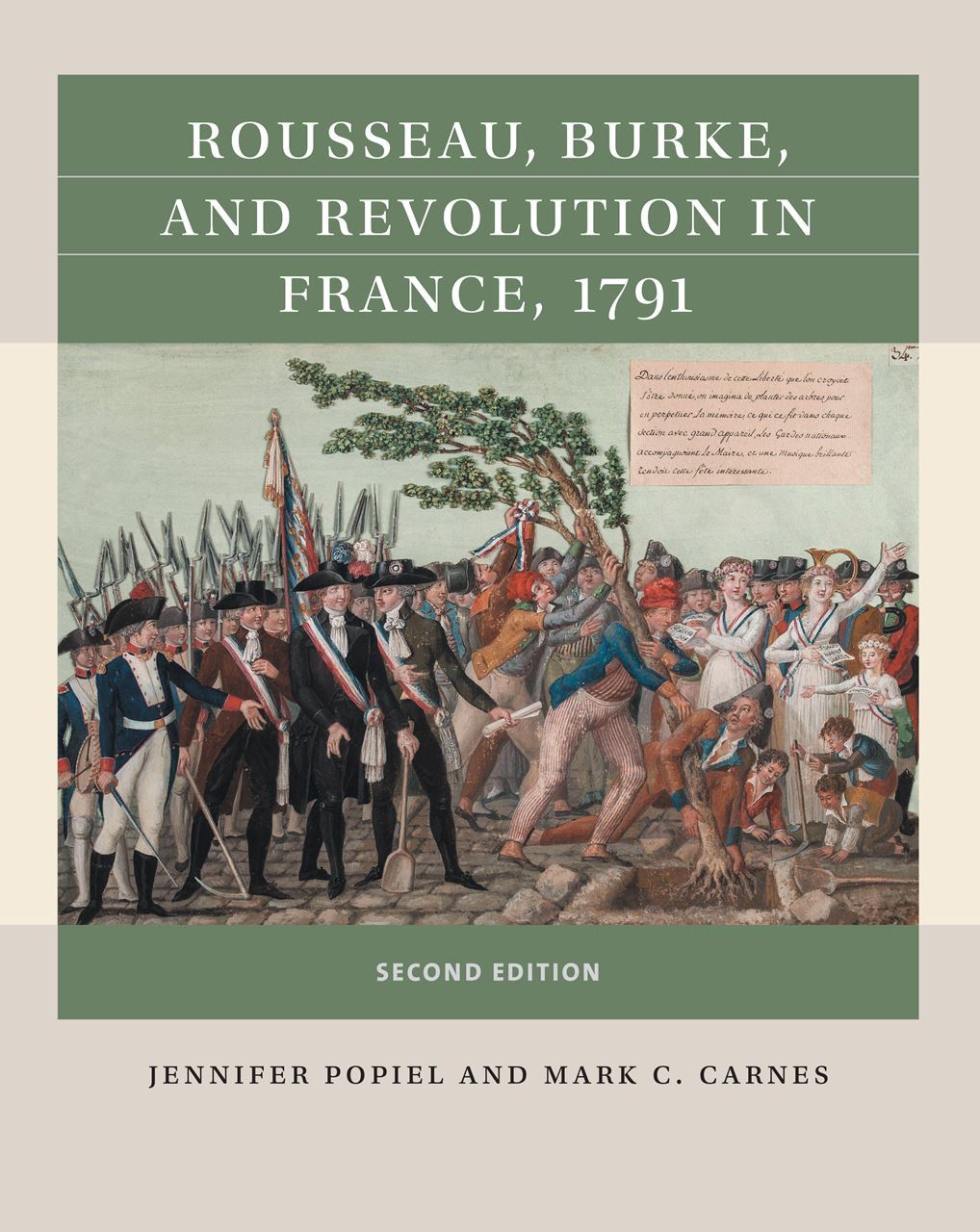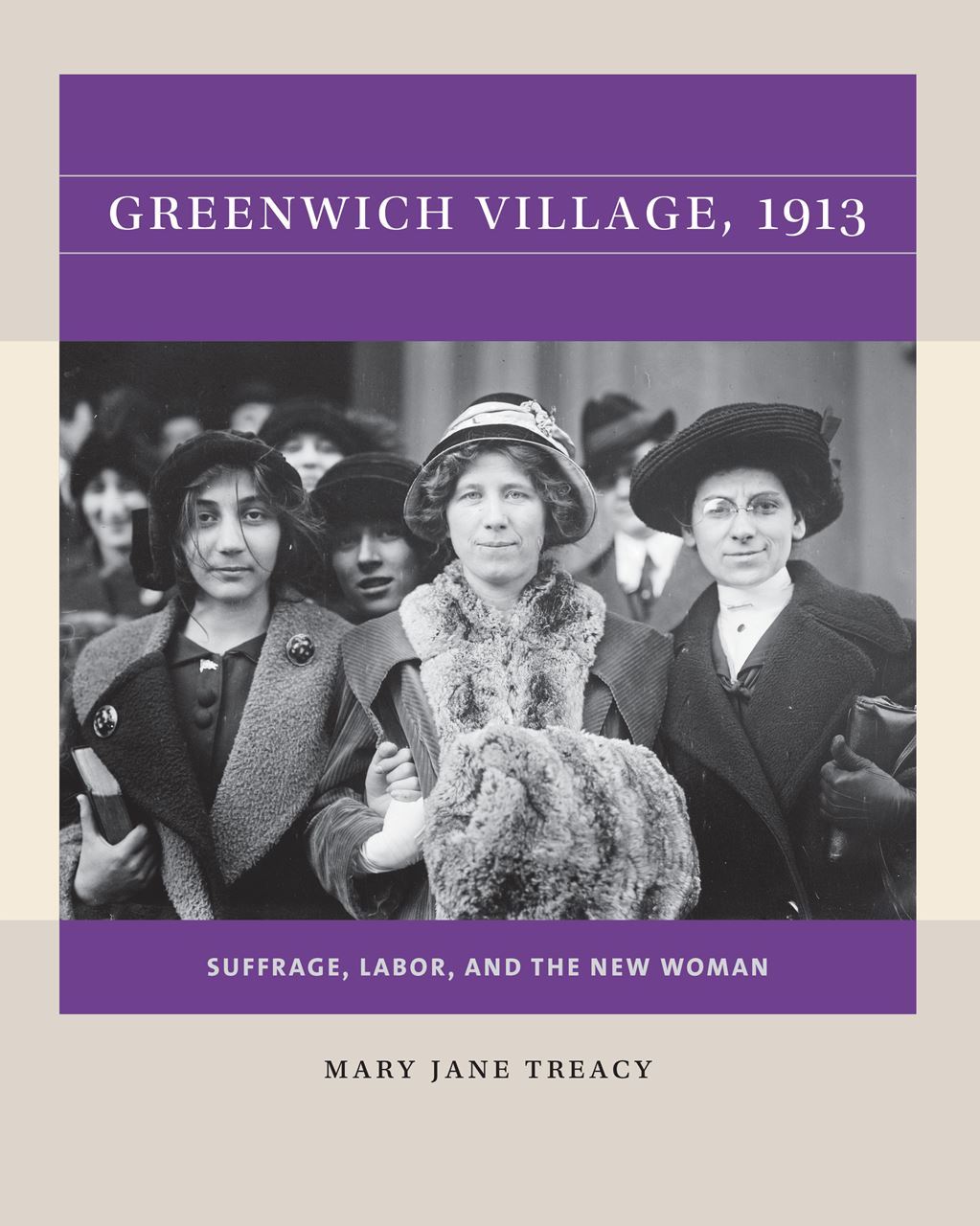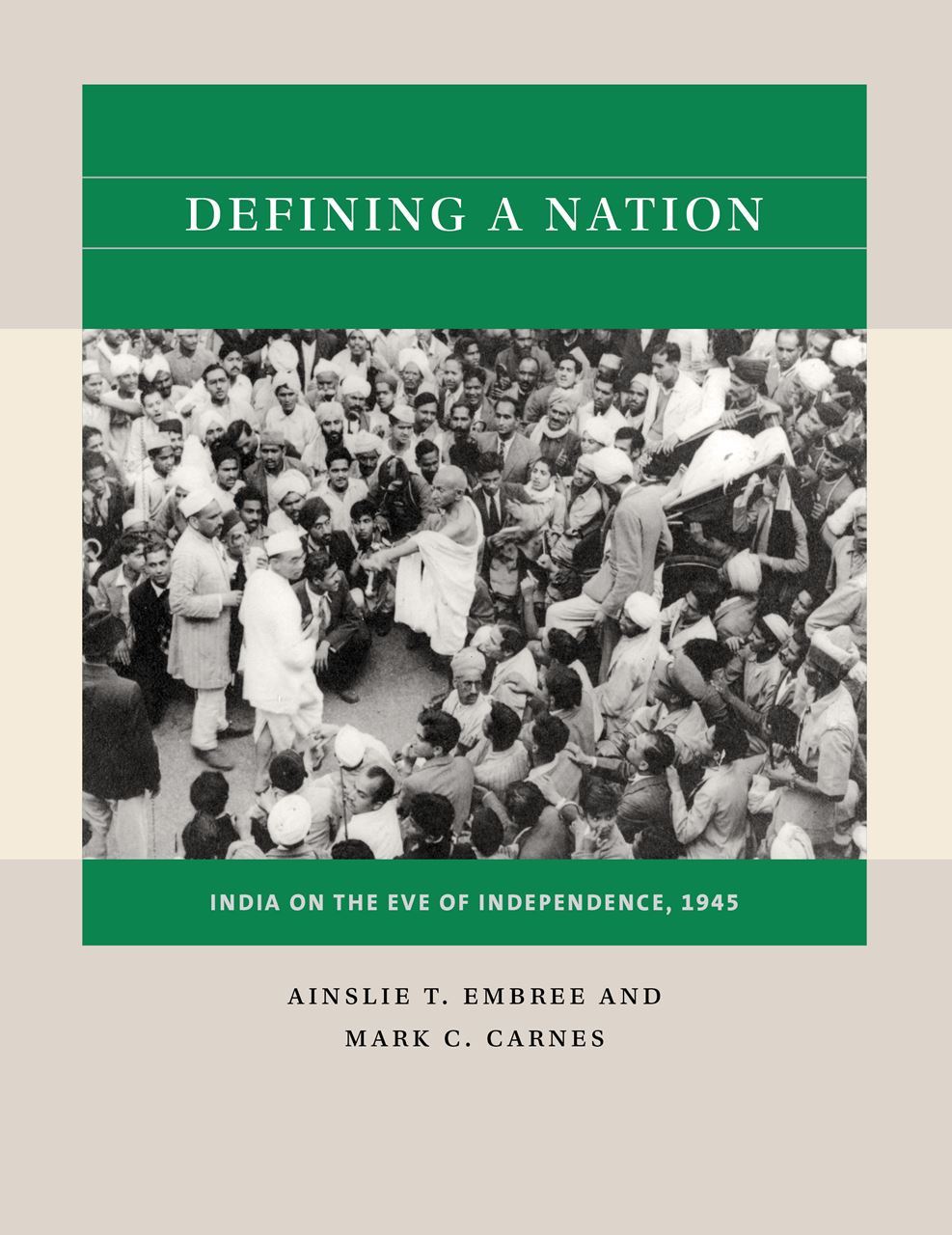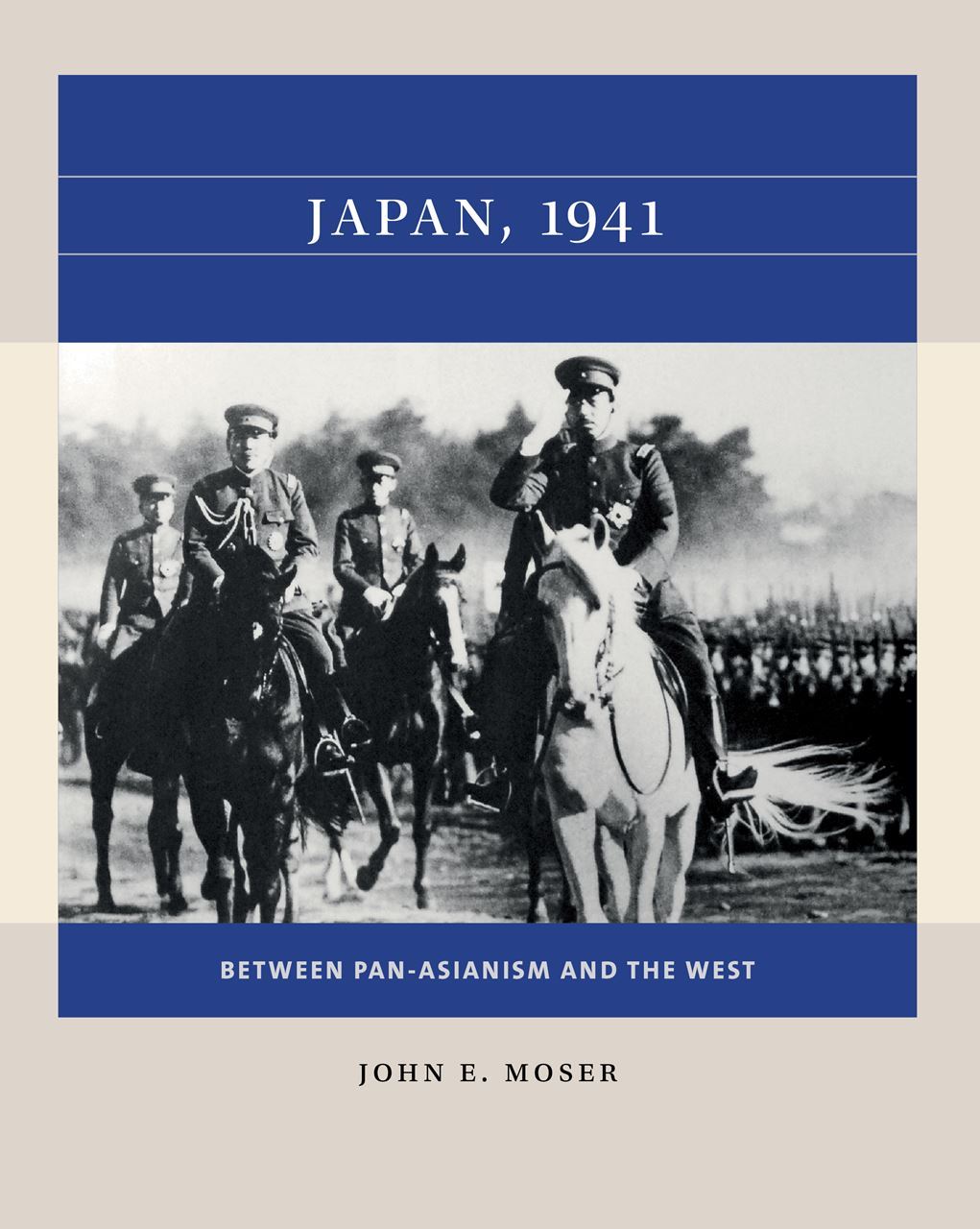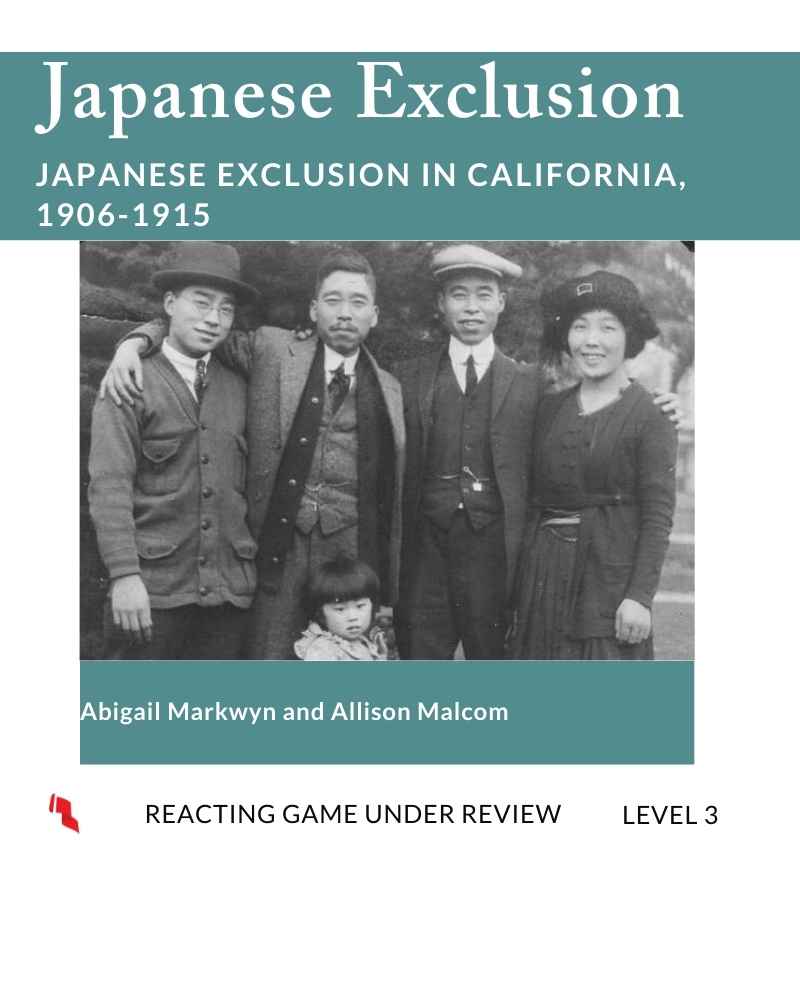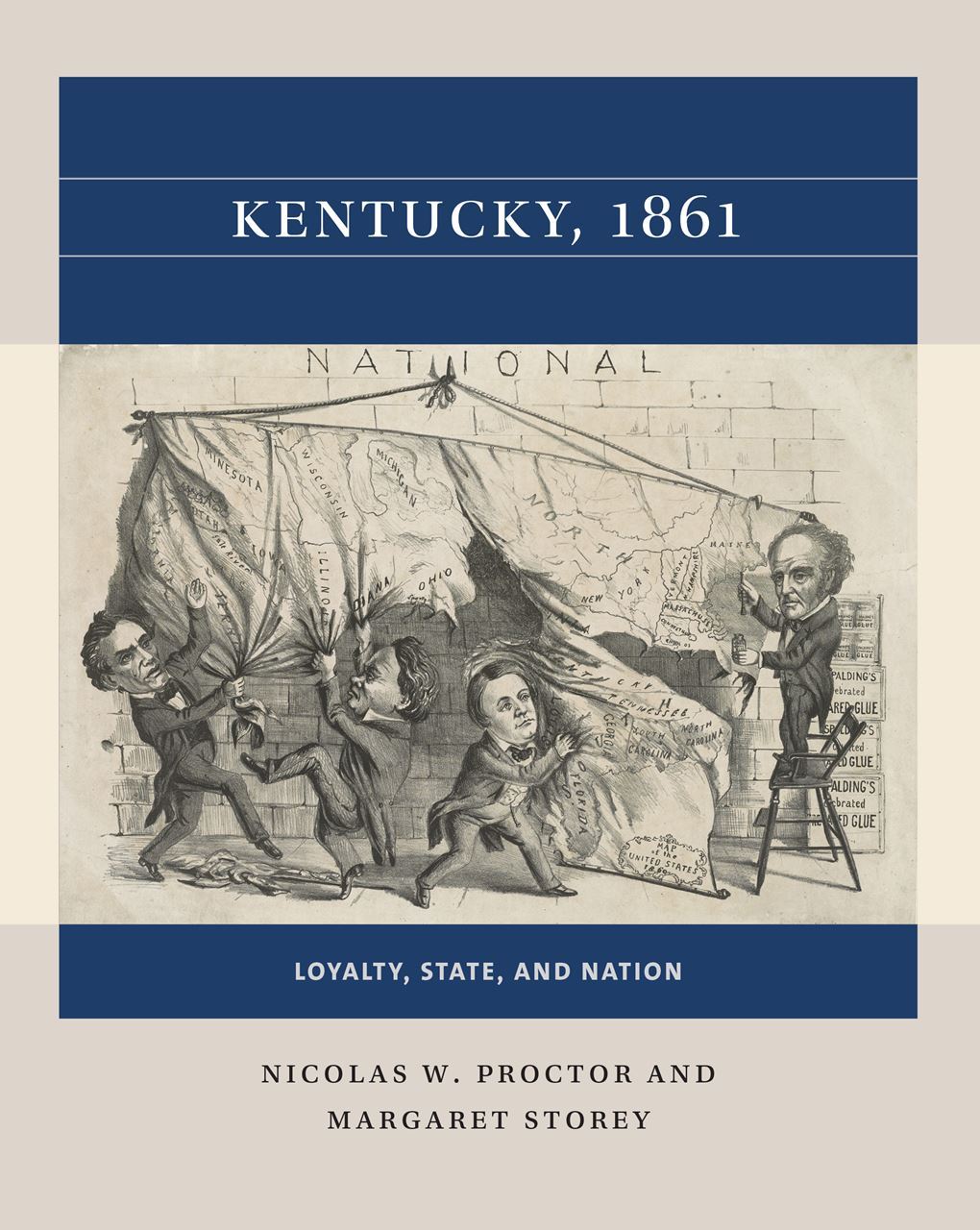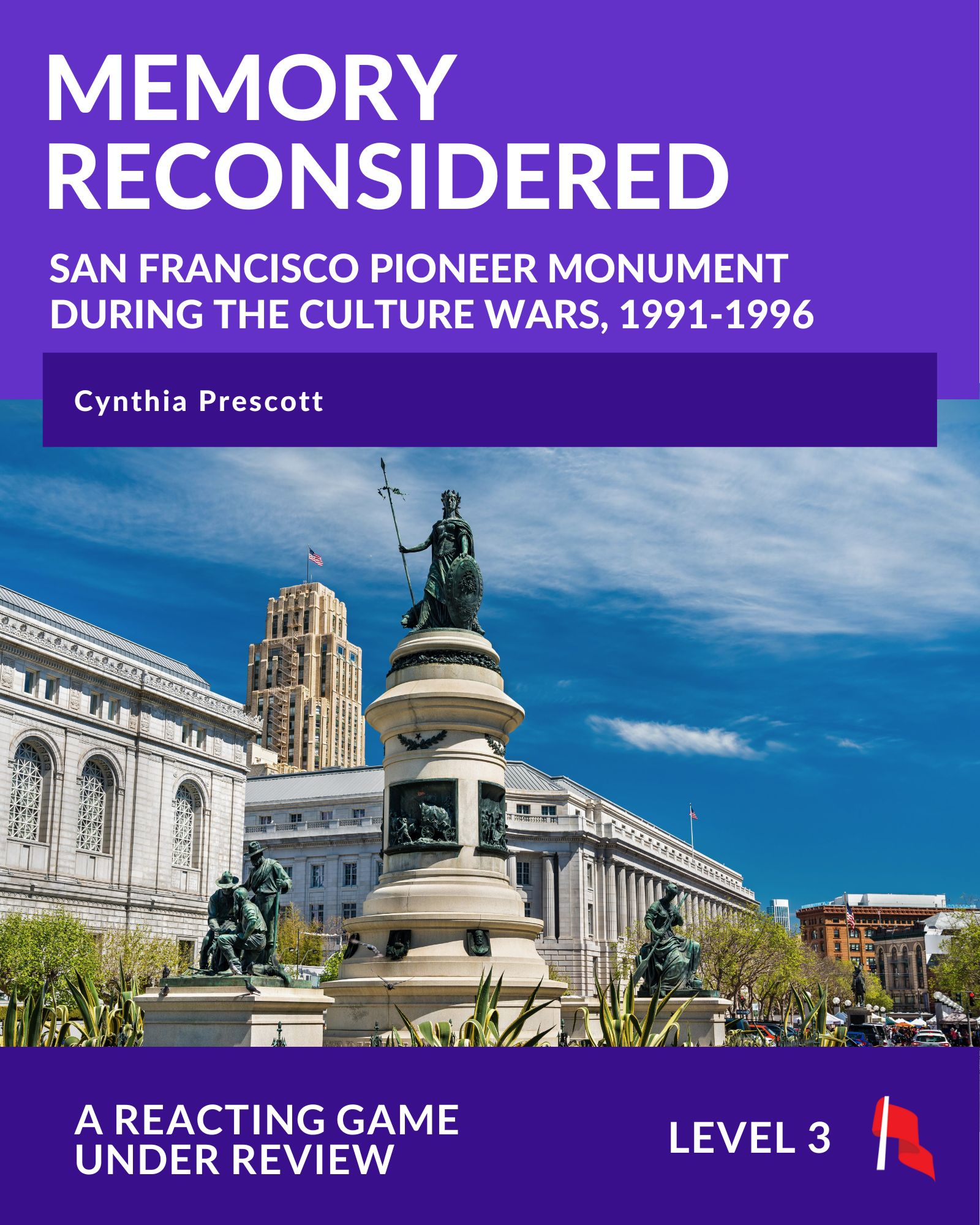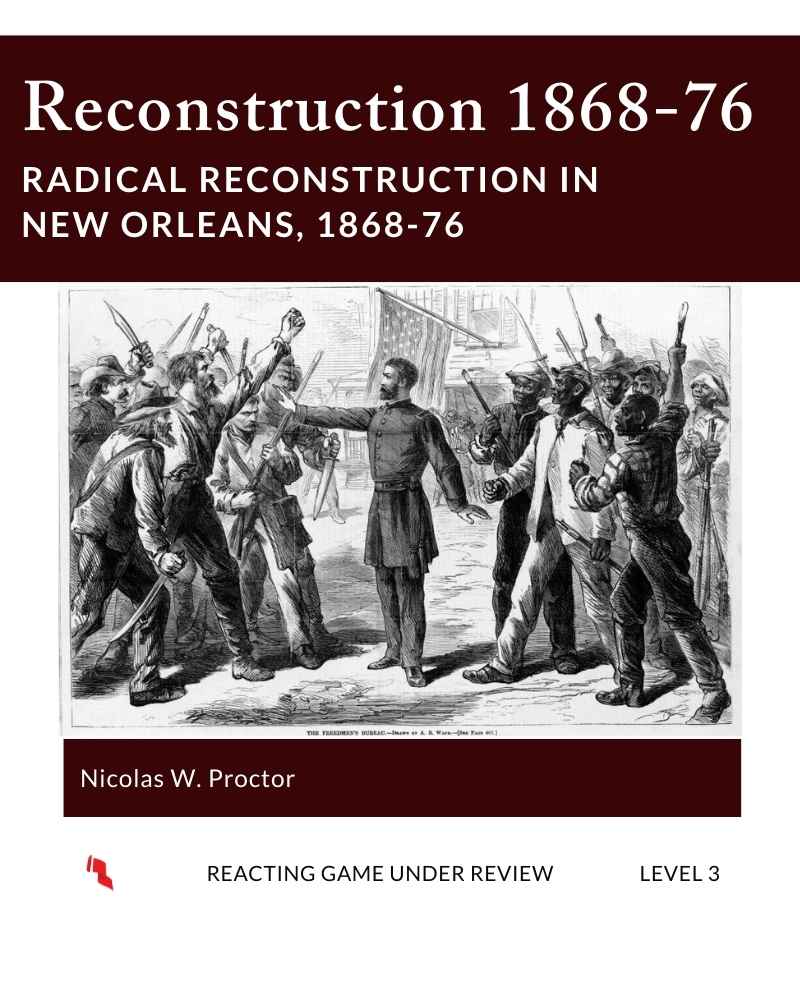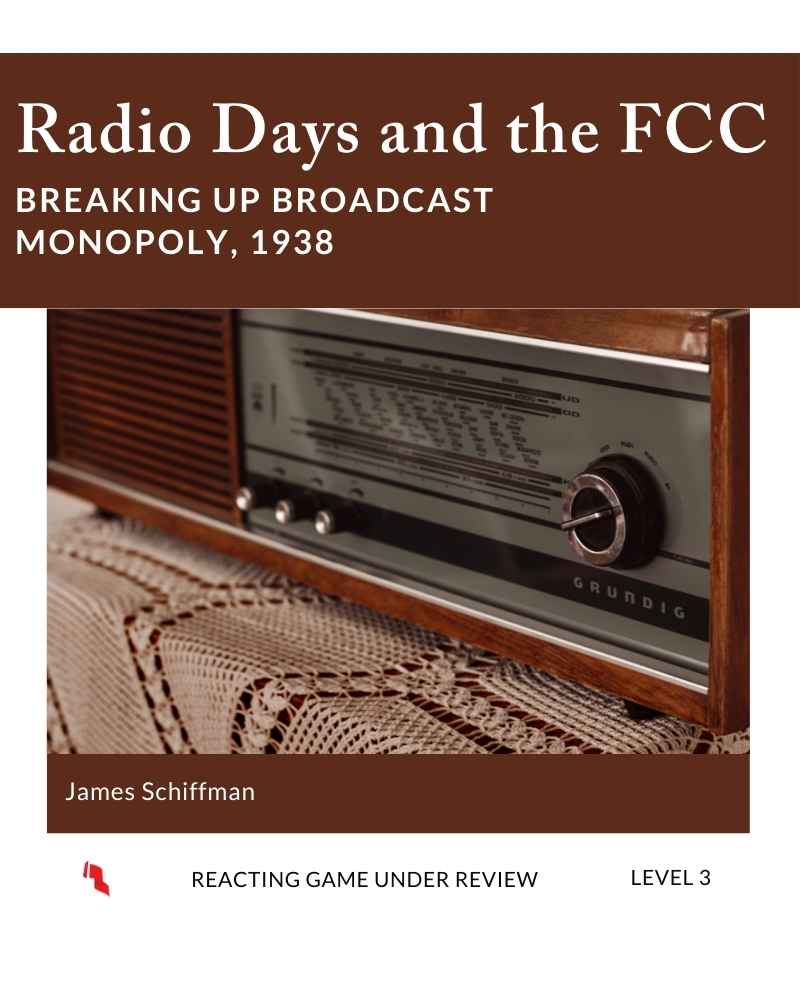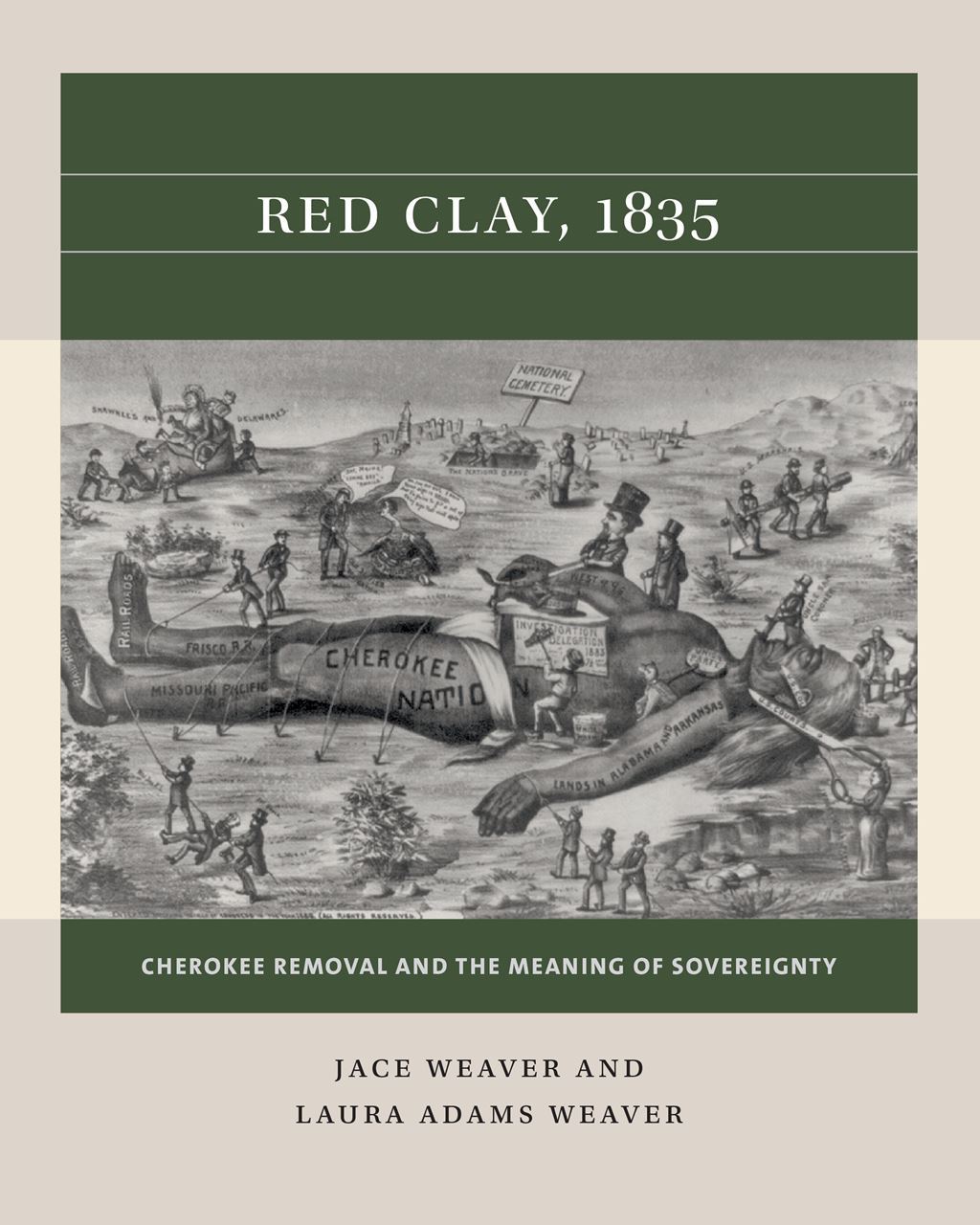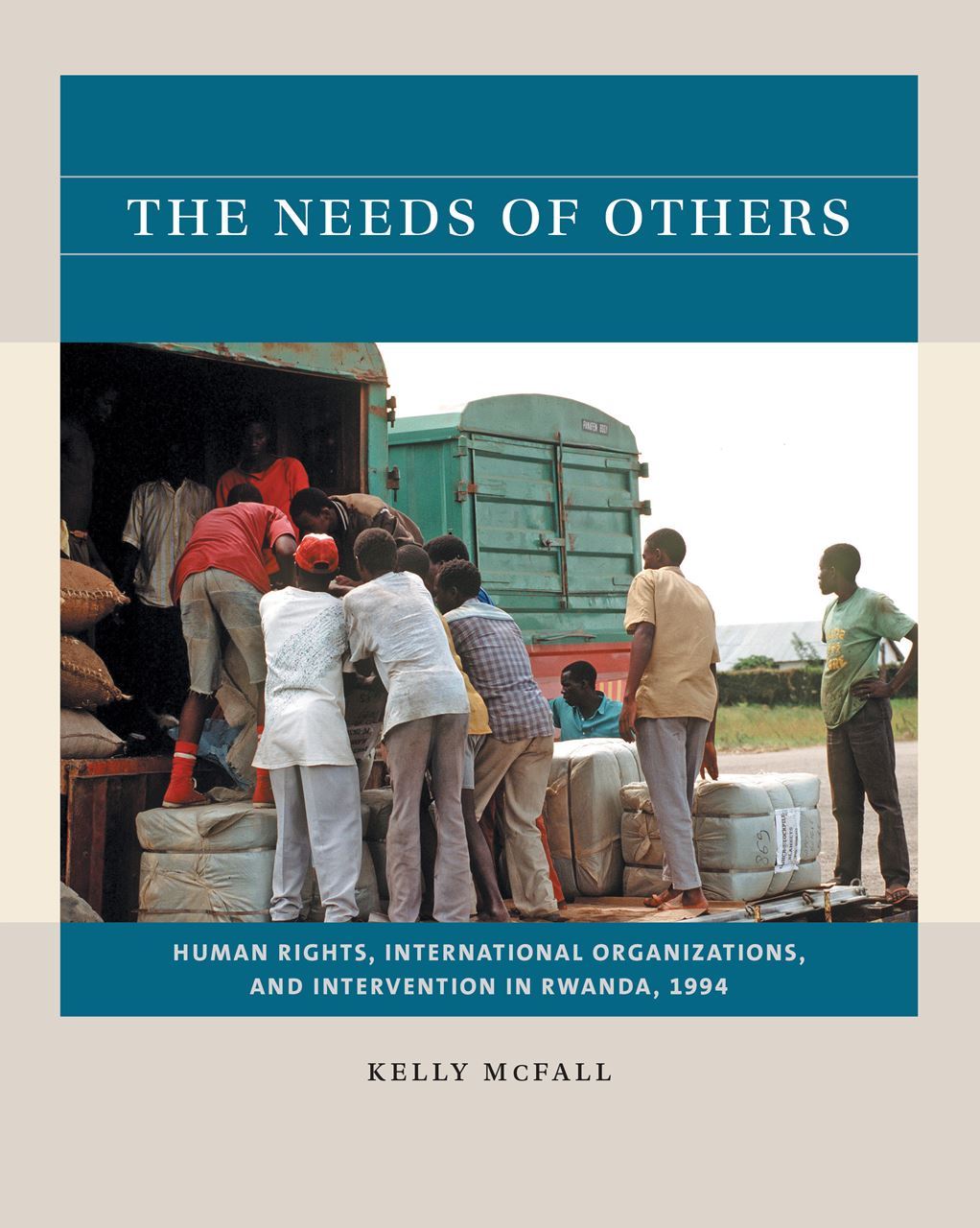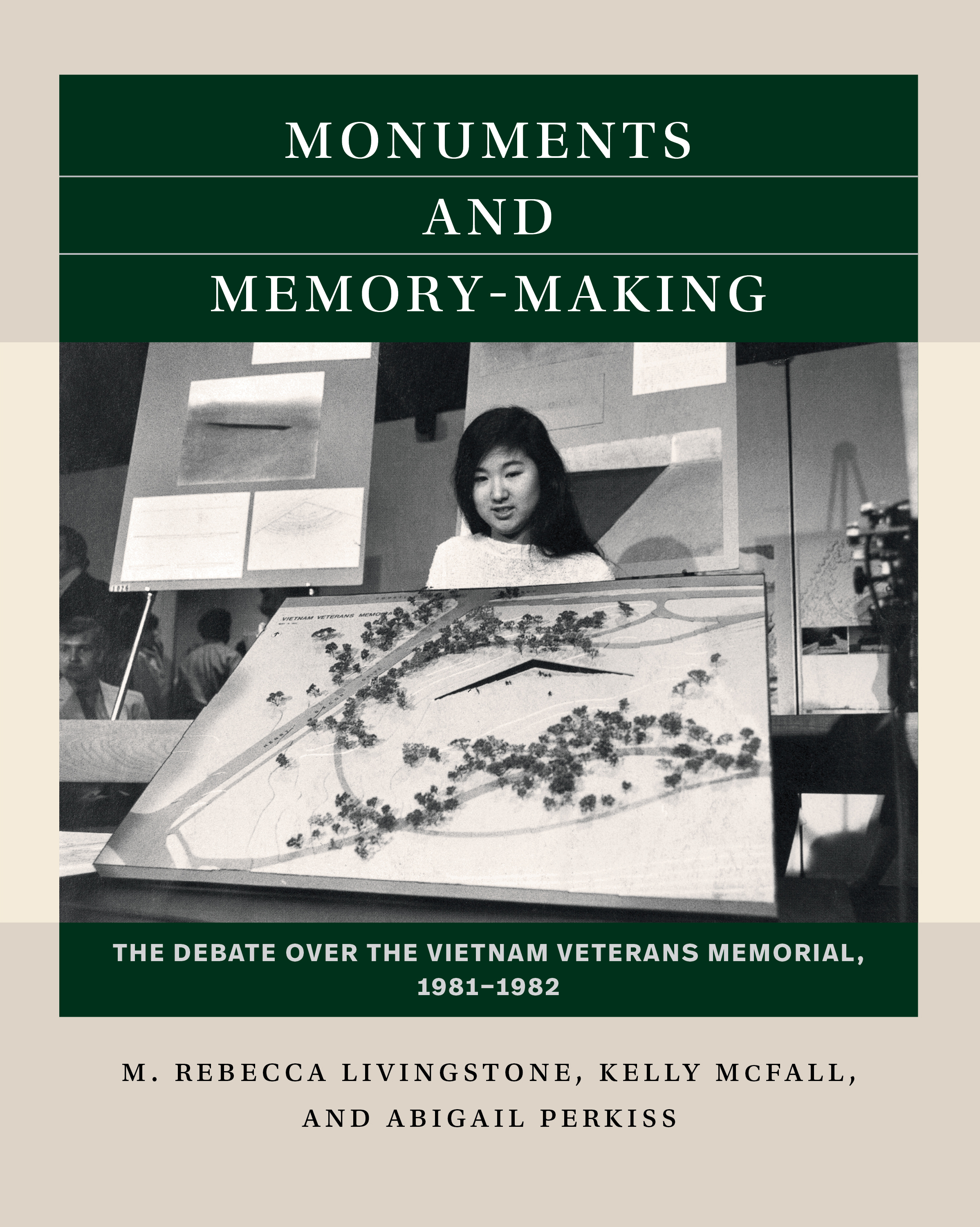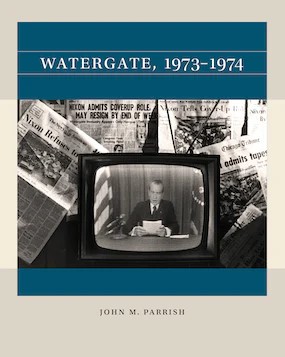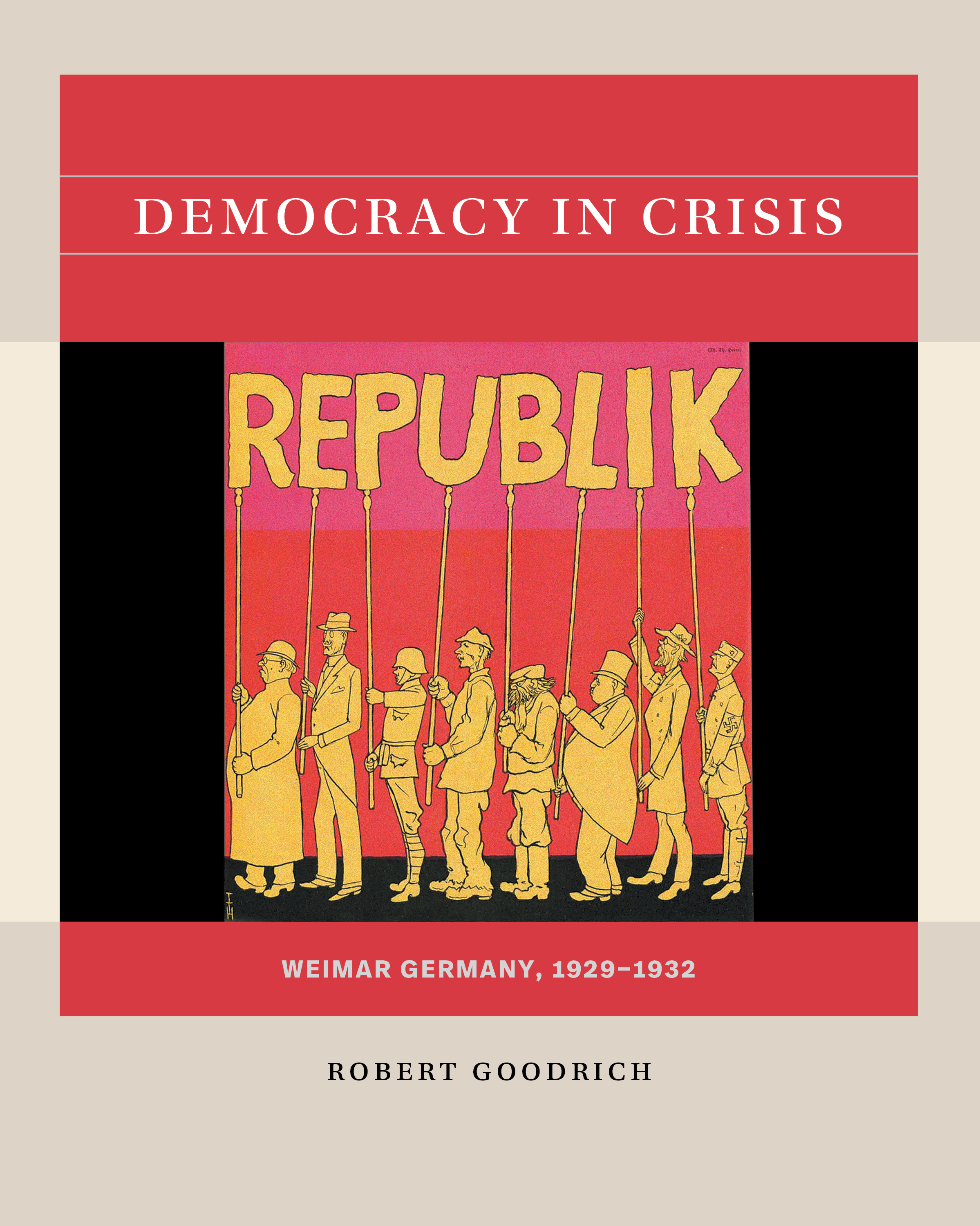|
JOURNALISM
Acid Rain in Europe, 1979-1989 Acid Rain in Europe covers the negotiation of the Long-Range Transport Pollution treaty. This was the first ever international pollution control treaty and remains at the forefront of addressing European pollution. 4-10 Sessions 11-40 Students 20th Century Europe Published Game (STEM) |
Patriots, Loyalists, and Revolution in New York City, 1775-1776 Enter the political and social chaos of a revolutionary New York City, where patriot and loyalist forces argued and fought for advantage among a divided populace. Students engage with the ideological foundations of revolution and government to have their side in control of New York City at the end of 1776. 7-11 Sessions 11-29+ Students 18th Century North America Published Game |
Argentina, 1985: Making Memory Argentina is at a crossroads. A military dictatorship has ended, a democratically elected president has taken office, and the nation begins to address its violent past: repression, political violence, labor unrest, "disappeared" citizens. This game brings these national debates to a secondary school that asks its students to seek information, tell a story about what happened at the school, and determine a path forward. 6+ Sessions 28-33 Students 20th Century South America Level 4 Game |
Ashoka: Becoming the Dharma King Ashoka returned from his successful war against Kalinga, grieved at the great suffering and loss of life he had brought to the land. He was determined to become a better Buddhist and a king who ruled not through force, but through the Dharma (literally “law,” but it comes to mean “true teaching” and “order of the universe”). As members of the Council, students represent the major traditions operative at Ashoka’s time: Brahmin Traditionalists, Jains, Ajivikas, and Buddhists who must advise the King on the policies that will help him become the Dharma-king. 7-9 Sessions 6-47 Students 3rd Century BCE Asia Level 3 Game |
Politics, Religion, and the Birth of the Public Sphere: England, 1685-1688 Places students in the turbulent political and religious debates of late seventeenth century England, debates that were fundamental in shaping modern civil society. Concludes by simulating the so-called “Glorious Revolution” of late 1688, resolving important player actions throughout the game. 3-6 Sessions 12-35 Students 17th Century Europe Level 3 Games |
Democrats gather at their National Convention in Chicago to debate a platform for a deeply divided party. Factions are split over issues such as civil rights, infrastructure, and the war on poverty—not to mention the war in Vietnam. 5-7 Sessions 14-61 Students 21st Century North America Published Game |
Climate Change in Copenhagen, 2009 Covers the negotiations at the Conference of Parties 15 meeting that was attended by a large number of national leaders. Also includes representatives of non-government organizations and the press. 4-6 Sessions 12-31 Students 21st Century Europe, International Published Game (STEM) |
After a Long Battle: Congressional Response to the AIDS Epidemic, 1982-1985 Asks players to put themselves in the shoes of those living at the height of the AIDS epidemic in America when next to nothing was known about the virus. By taking the roles of congressional representatives, government epidemiologists, doctors, researchers, gay activists, preachers, journalists, and citizens, students can understand the radical changes to society when a new disease caught the country unprepared. 6-11 Sessions 10-30 Students 20th Century North America Level 3 Game |
Diet and Killer Diseases: The McGovern Committee Hearings, 1977 Many trace the origin of the low-fat diet craze to the Senate hearings of the McGovern Committee in 1977. This game examines the scientific evidence available in 1977 by expanding the hearings to include a larger range of voices than were invited to the actual hearing. Students will take the role of senators and the media while examining scientific evidence at the time linking dietary fat to health. 3-8 Sessions 6-36 Students 20th Century North America Level 3 Game (STEM) |
Progressivism at High Tide: The Election of 1912 Places students in the midst of one of the most fascinating political events of U.S. history--the presidential election of 1912, in which all of the candidates described themselves as "progressive." But what did it mean to be "progressive"? Students must question the basic principles of progressivism, and how could one apply those principles into specific policy questions. 8 Sessions 13-31 students 20th Century North America Level 3 Game |
"Engines of Mischief": Technology, Rebellion, and the Industrial Revolution in England, 1817-1818 Players are faced with different choices about how to live and prosper at the dawn of the Industrial Revolution. Do you resist or embrace this new technology? Players must use new economic theories, parliamentary commissions, and news reports to debate the pros and cons of factories, the role of the government in the economy, taxation, workers’ unions, and the extension of political rights down the social order. 5-13 Sessions 10-28 Students 20th Century North America Published Game (What's this Mean? |
The Enlightenment in Crisis: Diderot's Encyclopedié in a Parisian Salon, 1750-? The story of the Encyclopédie is one of epic struggle, with colorful characters both famous and obscure. Participants will have to immerse themselves in salon culture, figure out who potential allies are, do written and oral work toward victory objectives, and build toward making ultimate decisions about their relationship to the Enlightenment as a whole and the Encyclopédie in particular. 8-11 Sessions 11-33 Students 18th Century Europe Level 3 Game |
U.S. Investment in Liberia, 1926-1932: "Mr. Firestone, What Are You Up To?" The ambitious investment by the Firestone Tire & Rubber Company in the West African country of Liberia is at a crossroads. Recent reports of slave labor in Liberia have come to the attention of the League of Nations and US State Department and the international attention given to these reports could have a grave impact on the future of the Company. The League of Nations has investigated the labor issues in Liberia and has called witnesses to London to provide their testimony: should the future of this troubled country include a role for the US company or is it time for Firestone to leave Liberia? 6-9 Sessions 14-30 Students 20th Century Africa Level 3 Game |
Food Fight: Challenging the USDA Food Pyramid, 1991 Set during a 1991 Congressional hearing that evaluated the USDA’s development of the Food Pyramid, a document that angered various agribusiness groups and some nutrition experts. This Open Access Reacting Game can be used in food and nutrition general education science courses and introductory chemistry and biology courses. 3-6 Sessions 11-35 Students 20th Century North America Published Game |
Food or Famine, 2002: The Debate over Genetically Modified Crops in Southern Africa Set in an African conference at which nations facing famine are confronted with the choice between accepting genetically modified (GM) corn from the USA and the risk that they will not be able to export their agricultural products to the EU as a result or allowing people to starve. Students learn about GM foods and the controversies over their safety, both for health reasons and ecological reasons. 4-5 Sessions 6-29 Students 21st Century Africa, International Level 3 Game (STEM) |
Rousseau, Burke, and Revolution in France, 1791 Plunges students into the intellectual and political currents that surged through revolutionary Paris in the summer of 1791. Members of the National Assembly gather to craft a constitution for a new France while wrestling with the threat of foreign invasion, power struggles, liberty, and citizenship. 8-14 Sessions 7-41 Students 18th Century Europe Published Game |
Greenwich Village, 1913: Suffrage, Labor, and the New Woman, Second Edition This game takes students to the beginning of the modern era when urbanization, industrialization, and massive waves of immigration were transforming the U.S. way of life. Suffragists and Labor organizers converge in Greenwich Village to debate their views with bohemians who seek personal transformations to create the new men and women of the twentieth century. Students must decide which social changes are most needed, the ideals they espouse, and the best ways to realize their goals. 8-9 Sessions 15-35 Students 20th Century North America Published Game |
Greenwich Village, 1913: Suffrage, Labor, and the New Woman Immerses students in the radical possibilities unlocked by the modern age. Exposed to ideas like women's suffrage, socialism, birth control, and anarchism, students experiment with forms of political participation and bohemian self-discovery. 8-9 Sessions 15-35 Students 20th Century North America Published Game |
Defining a Nation: India on the Eve of Independence, 1945 The British viceroy has invited leaders of various religious and political constituencies to work out the future of Britain’s largest colony. As British authority wanes, smoldering tensions among Hindus, Muslims, Sikhs, Communists and others increasingly flare into violent riots that threaten to engulf all India. 11-12 Sessions 11-35 Students 20th Century Asia Published Game |
Japan, 1941: Between Pan-Asianism and the West Students are thrust into the middle of Japan's strategic dilemma during the early years of World War II. Japan is in dire need of resources but risk war with Western and Soviet powers if they take them by force. Taking on the roles of leading figures in Tokyo, participants are asked to advise the emperor on how to proceed. 9-14 Sessions 12-30 Students 20th Century Asia Published Game |
Japanese Exclusion in California, 1906-1915 In the wake of the 1906 earthquake, a progressively-minded San Francisco School Board votes to remove Japanese schoolchildren from their regular schools in order to send them to the segregated “Oriental School” in Chinatown. This event occurs against a backdrop of violent attacks on Japanese people in California. 6-12 Sessions 10-42 Students 20th Century North America Level 3 Game |
Kentucky, 1861: Loyalty, State, and Nation Pulls students into the secession crisis following Lincoln's 1860 election. During a special session of the Kentucky legislature, set against the looming threat of violence, students grapple with questions about the future of slavery and the constitutionality of secession. 6-10 Sessions 11-28+ Students 19th Century North America Published Game |
Memory Reconsidered: San Francisco Pioneer Monument During the Culture Wars, 1991-1996 Amid the 1990s Culture Wars, players debate whether to preserve, relocate, reinterpret, or remove a controversial public monument. Debates are centered around the connection between memory and identity and the impact of history on public issues. 4-8 Sessions 12-31 Students 20th Century North America Level 3 Game (What's this Mean?) |
Mexico in Revolution, 1912-1920 Rifts between the elite and poor have led to unrest and a series of revolts. But with the ousting of President Porfirio Díaz there is a chance to reform Mexico and make it a better nation for all of its inhabitants. Will new leaders stabilize their country and prevent another civil war? Or will Mexico spiral out of control? 3-11 Sessions 14-35+ Students 20th Century North America Published Game |
Radical Reconstruction in New Orleans, 1868-1876 At the end of the Civil War, the Thirteenth Amendment ended slavery, but this was not the end of conflict. As the largest city in the South, New Orleans was home to thousands of recently-enslaved Freedpeople as well as French-speaking Black Creoles, white unionists, German immigrants, and Yankee carpetbaggers. This game examines the ways in which these groups interacted with one another and contended with the myriad challenges of the Reconstruction era. 6-7 Sessions 11-30 Students 19th Century North America Level 3 Game |
Radio Days and the FCC: Breaking up Broadcast Monopoly The Federal Communications Commission is holding hearings on what to do about the perceived monopoly power that the major radio networks – NBC and CBS – exercise over their affiliated stations. Game sessions involve witnesses taking testimony on a series of six questions before the Commission and culminates in a final, decisive vote that will decide the future of the radio industry. 5-13 Sessions 10-28 Students 20th Century North America Level 3 Game |
Red Clay, 1835: Cherokee Removal and the Meaning of Sovereignty A treaty negotiation in Red Clay, Tennessee will decide the terms of American Indian removal from the American Southeast. As pressure mounts on the Cherokee to accept treaty terms, students must confront issues such as nationhood, westward expansion, and culture change. 8-9 Sessions 14-30+ Students 19th Century North America Published Game |
Russian Literary Journals, Dostoevsky, and Tolstoy in St. Petersburg, 1877 Editors, writers, censors, and businesspeople will compete to produce a successful literary journal, which requires a nuanced understanding of political philosophies and writing styles as well as solid finances and social connections. Roles, will give students the option of producing their own creative work, analyzing an existing work, or commenting on social issues in Elena Shtakenshneider’s literary salon. 8-17 Sessions 15-30 Students 19th Century Europe/Asia Level 4 Game |
The Needs of Others: Human Rights, International Organizations, and Intervention in Rwanda, 1994 Diplomats have learned of violence in Rwanda and must act quickly to prevent further bloodshed. Students representing UN ambassadors, human rights organizations, journalists, and public opinion leaders, must wrestle with decisions on how to respond based on an unsteady trickle of information. 7-10 Sessions 14-32 Students 20th Century Africa, International Published Game |
Changing the Game: Title IX, Gender, and College Athletics A debate over the role of athletics quickly expands to encompass demands that women’s sports and athletes receive more resources and opportunities. The result is a firestorm of controversy on and off campus. Students wrestle with questions of gender parity and the place of athletics in higher education. 7-10 Sessions 10-40+ Students 20th Century North America Published Game |
A Different Kind of War: The United States, The Cold War, and Vietnam, 1963-65 The game examines the violent and sometimes brutal interactions between communist efforts to liberate the nations of the “Third World” from colonialism, American fears about Communist aggression, the resulting US strategy of containment, and the volatile situation in Southeast Asia during the mid-1960s. 5-9 Sessions 25-30 Students 20th Century North America Level 3 Game (What's this Mean?) |
Monuments and Memory-Making: The Debate over the Vietnam Veterans Memorial, 1981-1982 When the Vietnam War drew to a close, the process of memorializing the conflict resulted in a tug-of-war over the national narrative of the 20+ year struggle. Students will take part in the conversations and controversies that emerged as the nation grappled with how best to memorialize what was at the time the longest conflict in US history. 8-9 Sessions 10-35 Students 20th Century North America Published Game |
Watergate, 1973-1974 Students experience the unfolding of America’s most dramatic constitutional crisis of the 20th century: the investigation of the Watergate burglary and its subsequent cover-up. With the world’s most powerful person barricading himself within the walls of the White House and threatening to take the constitutional order itself hostage to ensure his political survival, how could well-intentioned leaders pursue truth and justice without risking collateral damage to the nation’s foundational principles and institutions? 9 Sessions 12-30 Students 20th Century North America Published Game (What's this Mean?) |
Democracy in Crisis, Weimar Germany, 1929-1932 Liberalism, nationalism, conservatism, social democracy, Christian democracy, communism, fascism, and every variant of these movements contend for power in Germany. As delegates of the Reichstag, players must contend with street fights, trade union strikes, assassinations, and insurrections, along with intense parliamentary wrangling. 8-12 Sessions 8-60+ Students 20th Century Europe Published Game |


